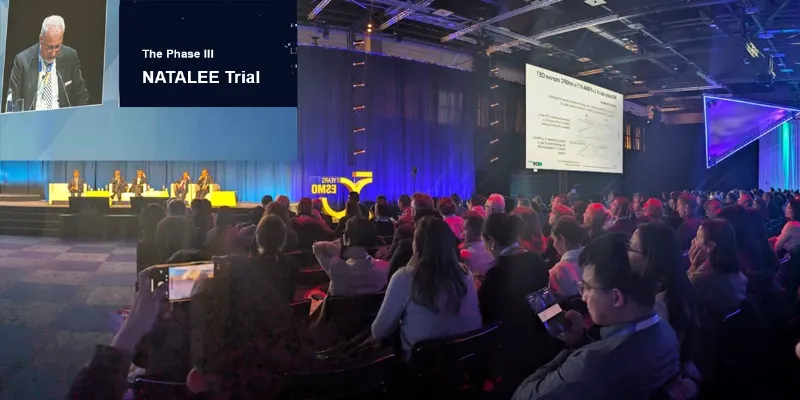Ribociclib Extends Disease-Free Survival Beyond Treatment in HR+/HER2– Early Breast Cancer

3 November 2025
Five-year data from the Phase III NATALEE trial confirm that adjuvant ribociclib (Kisqali) plus endocrine therapy reduces recurrence risk by 28% in patients with HR+/HER2– early breast cancer. The regimen achieved 85.5% five-year invasive disease-free survival versus 81% with endocrine therapy alone, with durable benefit beyond treatment completion, and no new safety signals.
Novartis announced results from the five-year Phase III NATALEE trial showing that the CDK4/6 inhibitor ribociclib, in combination with endocrine therapy, provides durable protection against disease recurrence in patients with HR+/HER2– early breast cancer. Presented at the ESMO 2025 Congress, these findings mark an important milestone for adjuvant therapy in this common subtype, which accounts for roughly 70% of all breast cancer cases.
Sustained Benefit Beyond Treatment Completion
After a median follow-up of 58 months, patients who received ribociclib plus a nonsteroidal aromatase inhibitor (NSAI) showed a 28.4% reduction in the risk of invasive disease recurrence compared with endocrine therapy (ET) alone. The five-year invasive disease-free survival (iDFS) rate was 85.5% in the combination arm versus 81.0% in the ET-alone arm—an absolute improvement of 4.5%.
Importantly, this benefit persisted nearly two years after patients had completed the three-year ribociclib treatment course, underscoring the long-term disease control achieved with the addition of CDK4/6 inhibition.
Broad Efficacy Across Subgroups
The advantage of ribociclib was consistent across all major clinical subgroups, including those with node-negative disease (HR = 0.606; 95% CI 0.372–0.986), traditionally considered at lower risk. This broad efficacy differentiates Kisqali from other CDK4/6 inhibitors, extending its potential to the widest population yet studied in early breast cancer.
“The fear of recurrence weighs heavily on patients even after completing initial therapy,” commented Dr. John Crown, Consultant Medical Oncologist at St. Vincent’s University Hospital in Dublin and an investigator in NATALEE. “These five-year results show that the benefit of ribociclib persists well beyond the completion of treatment, offering these at-risk patients a greater chance of living breast cancer-free.”
Emerging Overall Survival Trend
The updated analysis also revealed a positive trend in overall survival (OS). The hazard ratio for death improved to 0.800 (95% CI 0.637–1.003) compared with the previous analysis (HR = 0.892), representing a 20% reduction in the risk of death versus ET alone. Follow-up is ongoing to confirm this emerging survival advantage. A 29.1% risk reduction in distant disease-free survival further supports the potential of ribociclib to prevent metastatic recurrence, the leading cause of mortality in breast cancer.
Consistent Safety Profile Over Five Years
No new safety signals were identified with extended follow-up. Rates of secondary primary malignancies were similar between treatment arms (2.7% with ribociclib vs. 3.0% with ET alone), and serious adverse events remained consistent with previously reported data.
"These data reinforce the potential of Kisqali to significantly reduce the long-term risk of breast cancer recurrence, extending well beyond the three-year treatment period. This provides physicians and patients with greater confidence in long-term disease management. Kisqali is redefining the standard of care in adjuvant therapy, including in patients with node-negative disease," said Dushen Chetty, Global Head of Oncology and Hematology Development at Novartis, Ad Interim.
Trial Overview
NATALEE is a global, multicenter, randomized Phase III trial enrolling 5,101 patients with stage II or III HR+/HER2– early breast cancer across 20 countries. Participants were randomized to receive ribociclib (400 mg/day; 3 weeks on, 1 week off for 3 years) plus an NSAI (letrozole 2.5 mg or anastrozole 1 mg daily for 5 years), or NSAI alone. Premenopausal women and men received goserelin for ovarian suppression. The primary endpoint was invasive disease-free survival, with secondary endpoints including distant recurrence-free and overall survival.
Implications for Clinical Practice
Ribociclib is the only CDK4/6 inhibitor to demonstrate statistically significant and clinically meaningful benefit in both advanced and early breast cancer, supported by positive overall survival data from the MONALEESA-2, -3, and -7 trials. In early disease, it remains the only CDK4/6 inhibitor recommended by NCCN Guidelines® as Category 1 preferred for both node-positive and high-risk node-negative patients.
Ribociclib has also received the highest European Society for Medical Oncology (ESMO) Magnitude of Clinical Benefit Scale (MCBS) rating among CDK4/6 inhibitors, with a score of “A” in early breast cancer.











Comments
No Comments Yet!